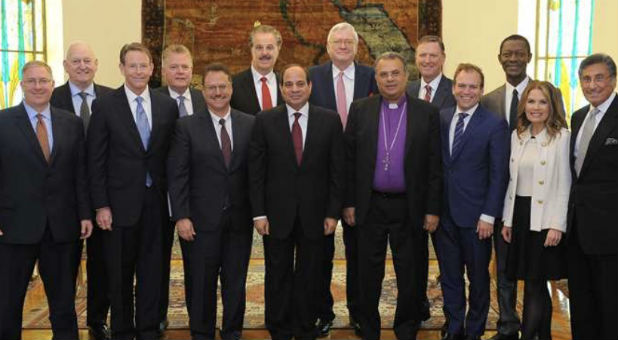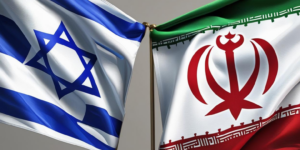Evangelicals Join With Egyptian President in Prayer as Country Rallies Against Radical Islam
I had the opportunity to meet Egyptian President el-Sisi.
Joining the president in the meeting with us were two key figures. The first is Khalid Fawzi, the chief of Egyptian intelligence. The second was Dr. Andrea Zaki, the president of the council of Protestant Churches in Egypt, representing some two million evangelical Christians.
The president invited us to ask anything we wanted, and we covered a wide range of issues. Most importantly, we told the president that we came not simply for a meeting, but to build a long-term friendship between evangelical Christians and him and the leadership and people of Egypt, as well as our Christian brothers and sisters here. He indicated that’s what he would like, as well.
Please pray for Mr. el-Sisi and his team. They are courageously fighting a winner-take-all-battle against Radical Islamist terrorists. They are working to stabilize a country that was going up in flames under the hellish tyranny of the Muslim brotherhood. They are determined to rebuild a shattered economy, safeguard all Egyptians (including the nation’s Coptic Orthodox, Protestant and Roman Catholic Christians), rebuild churches destroyed or damaged during the Arab Spring, maintain the peace treaty with Israel and rebuild the U.S.-Egyptian alliance deeply damaged under President Obama.
This is not easy work, and there are forces determined to destroy him and his nation.
The president asked us to pray for him and for all Egyptians, and we committed to doing just that.
Over the next few days, I’ll report more on this historic meeting, as well as post news stories that are beginning to run in the Egyptian, American and Israeli media. For now, let me share with you the official photos and press release issued by the palace:
President Abdul Fattah el-Sisi welcomed on Wednesday a delegation of leaders of the American evangelical community, in the presence of Khalid Fawzi, head of the General Intelligence, and Rev. Dr. Andri Zaki, head of the evangelical community in Egypt.
Bassam Radi, spokesman for the presidency, said that the president welcomed the delegation members at the beginning of the meeting, expressing condolences to the victims of the Manhattan terrorist incident which took place last night in New York. The president pointed to Egypt’s keenness to strengthen bridges of communication and understanding with various sectors of American society to address the challenges facing the two countries.
The president affirmed Egypt’s openness to all religions and sects and the firm belief that acceptance of diversity, the general framework that must unite the people all over the world and thus highlight the importance of dialogue between these people in all different sects and races. The president also noted Egypt’s eagerness to uphold the principles of citizenship, equality and non-discrimination among citizens on any religious, sectarian or other basis, as well as the consolidation of a culture of pluralism and acceptance of the other.
The spokesman added that the members of the American delegation expressed their appreciation to Egypt’s leadership and people, pointing out Egypt’s role as the cornerstone of stability and moderation in the Middle East. Members of the delegation expressed their solidarity with Egypt in the face of terrorism, which addresses it with determination and strength, pointing to their confidence in Egypt’s ability to overcome the difficulties posed by the current challenges.
Ambassador Bassam Radi said that the meeting tackled ways to confront terrorism. The president affirmed that the elimination of terrorism in the region and beyond will only be achieved through collective action and the adoption by the international community of a multi-pronged strategy. All elements and parties supporting terrorist organizations will be dealt with, in order to stop providing shelter, weapons, training camps or funding. The president also stressed the importance of supporting efforts to restore stability in the region and to consolidate national institutions with their countries, in order to fill the vacuum that provides an opportunity for the growth of terrorism.
This article originally appeared on Joel C. Rosenberg’s blog.




























































